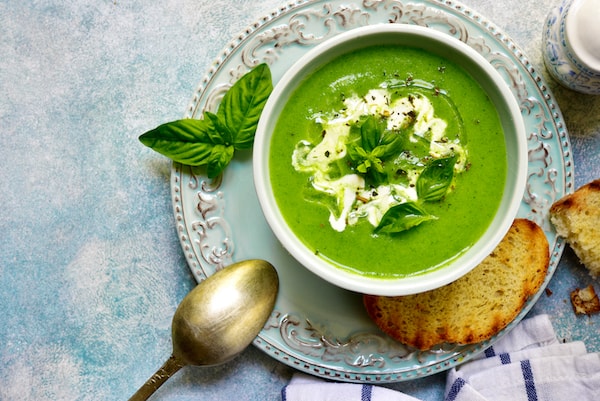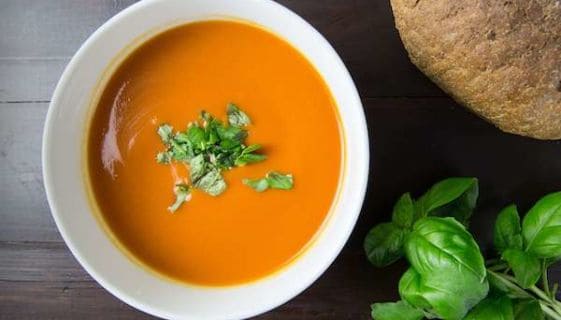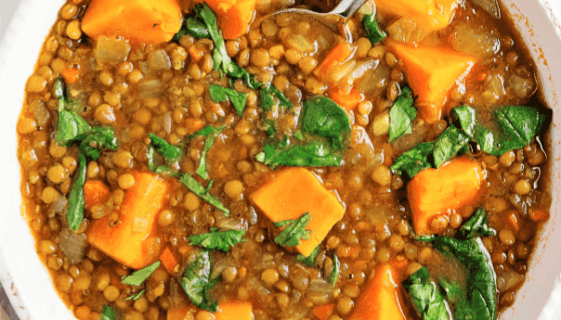The calendar says spring is coming, but the reality is that we are still stuck in a fluctuating weather pattern resulting in wool sweaters one day and sandals the next. This transitional time can confuse our taste buds. Hmmm...do I crave a salad with fresh produce, or some warming creamy comfort food?
Our rich-tasting broccoli leek soup straddles both those worlds. This transitional soup is hearty, but lighter than a typical winter soup and packed full of seasonal ingredients. It is very creamy, without actual cream, and has a depth of vibrant flavors that evoke freshness. The herbaceous and earthy notes of broccoli shine through and are balanced with the sophisticated milder flavor of the leeks. The delicious ingredients provide an array of healthful properties that will help you shake off winter woes and welcome the vibrant flavors of spring.
Ingredients
- 2 tablespoons oil (olive, avocado or coconut)
- 3 leeks, washed and sliced (only the stock)
- 1 teaspoon fresh oregano or ½ teaspoon died
- ¼ teaspoon salt and pepper
- 6 cups of broccoli florets and stock cut into 1 inch pieces, fresh or frozen
- 1 small onion, peeled and quartered
- 4 garlic cloves, peeled and crushed (do this 15 minutes before using it)
- 2 cups non-dairy milk of choice (I have found oat or coconut or hazelnut work the best and hazelnut is my favorite in this recipe)
- 2 cups vegetable stock
Garnish: fresh herbs, dollop of yogurt or coconut yogurt, sprinkle of mustard powder and lemon zest
Directions
- To remove sand from leeks, trim off the roots and the tough, dark tops of the leaves. Peel away the outer layer from the stalk and discard.
- Halve and slice then place in a large bowl of water. Gently stir the sliced leeks until all the sand falls to the bottom of the bowl.
- Leaving the sand at the bottom of the bowl carefully remove the leeks with your hands and place in a colander to drain.
- Heat a medium pot over medium heat with oil for 1 minute
- Add the leeks, onion, oregano, and salt and pepper.
- Sauté vegetables until tender, about 10 minutes, stirring occasionally to ensure even cooking. (If beginning to brown turn heat down)
- Add the chopped garlic and sauté for 1 minute.
- Add broccoli, vegetable stock, and non-dairy milk to the pan and bring to a boil. Reduce heat and simmer until the broccoli is tender, about 15 minutes.
- Working in small batches, puree mixture in a food processor or blender until smooth. (If using a blender be sure to cover the venting hole with a paper towel or clean kitchen towel to avoid splashing and to allow steam to escape.)
- Return pureed soup to the original pot and heat to combine. Taste and adjust seasoning.
- To serve, top with 1 dollop yogurt of choice, a fresh herbs, sprinkle of mustard powder, lemon zest and freshly ground black pepper if you desire.
Nutritional Highlights
Leeks: Have similar health benefits as garlic and onions, due to being a great source of allicin, the sulfur compound that is antibacterial, cholesterol-lowering and has potential anticancer properties. Leeks also are a great source of a polyphenol called kaempferol to protect against heart disease. They are also a great prebiotic to feed the good bacteria in our gut.
Broccoli: A member of the Cruciferous family of vegetables, broccoli produces a compound called sulforaphane that has been shown to reduce tumor growth and cause cancer cells to self-destruct. It also boosts detoxifying enzymes and acts as an antioxidant, reducing oxidative stress as well as stabilizing blood sugar levels. Sulforaphane also aids in digestion by keeping the stomach lining healthy and the bacteria balanced. It has also been shown to reduce inflammation and block the enzyme that causes joint destruction.
Mustard: All cruciferous vegetables are part of the mustard family. Mustard seeds are rich in the enzyme myrosinase that can turn the glucosinolates in
cruciferous vegetables into isothiocyanates, a compound that stimulates the body’s antioxidant defenses. This condiment not only adds flavor but also can increase the anti-inflammatory, antibacterial and anticancer effect of other cruciferous vegetables.
Oregano: Just 1 teaspoon of dried oregano can fulfill 8% of your vitamin K needs. It has been shown to reduce inflammation and is especially high in two antioxidants that help prevent cellular damage. Can also help protect against harmful bacteria and boost the immune system.
Garlic and Onions: Considered a prebiotic, meaning it feeds the “good” bacteria in our gut and promotes a healthy digestive system. Research supports that the compounds such as allicin in garlic and onions have antioxidant, anti-inflammatory, antimicrobial, and cardioprotective properties.
Plant-based Milk: There are many different plant-based milk options: soy, almond, cashew, oat, pea, hazelnut, etc. All are great non-dairy options and in general they support cardiovascular health. Be sure to check for and avoid any additives, such as added sugar, flavoring and thickeners (including carrageenan, guar gum, or vegetable oil).



 Ananda Kaplan
Ananda Kaplan


